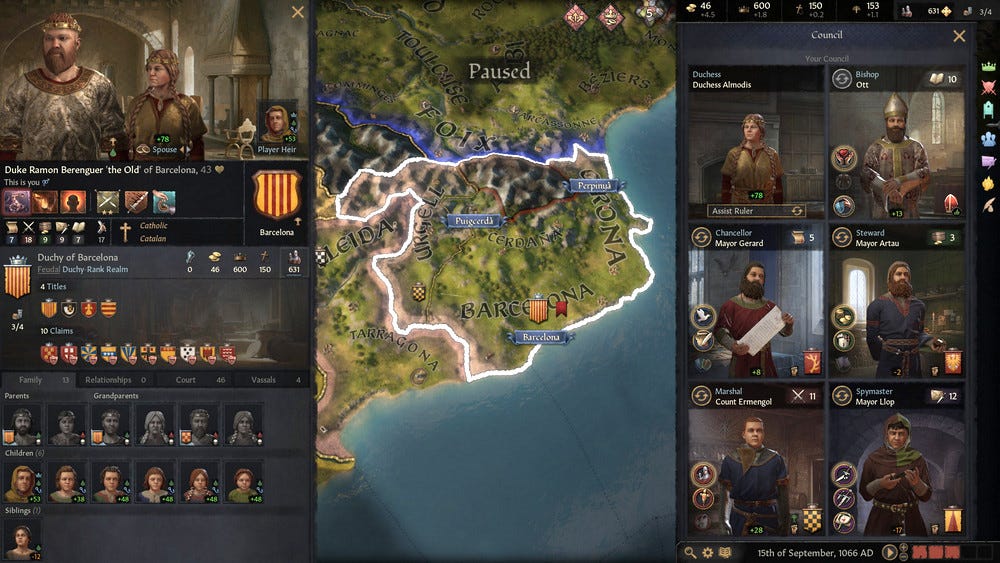And Your Week 6+7 Challenges Are...
...only slightly less compelling than a container ship stuck in the Suez Canal.
Hello again!
Welcome to another bunch of Everything Is Amazing challenges, designed to sprinkle some healthy chaos into your life, currently presented in a lockdown-appropriate form.
(If you want to know why it’s good to have some healthy chaos in your life, read this.)
The rulebook dances to the following tune:
You pick one or more of these challenges and have a stab at them over the coming week.
If you complete any of them, you might enjoy fun, meaningful benefits over time, in random and unpredictable ways. No promises, but yup, it happens.
First time doing one of these? Fantastic - that gives you a whopping twenty-five to choose from today. Here are the first, second, third and fourth installments.
Know someone else you could rope in? Grab ‘em with the button below:
Off we go!
1) Talk (Properly) To A Stranger
This is the thinking behind my ongoing Everyone Is Amazing calls (which you can still sign up to here).
The aim here is to talk to a stranger:
Please, steal this idea from me. No, seriously. Do that. It really works. Over the last 12 months, how many times did you strike up a conversation with a stranger? Do you miss it - that little electric sizzle of nervous, delighted awkwardness that pushes you right into this moment, right here now, and keeps you on your toes?
If the answer is “now you mention it, I miss it so much” - then open a free account at Calendly or some other similar service, & put aside half an hour or more, a few days a week. Ask people you miss chatting with in person - then invite people you’ve never met in person. Try it. It might be exactly what you need.
You could copy this method - or you could invent an even more cunning and socially weird one. The way you do it doesn’t matter. Get creative and surprise/outweird yourself!
The aim here is to spark a conversation with a complete stranger in a way you haven’t enjoyed since before the pandemic struck. Maybe that’s about duration - chatting for minutes instead of seconds. Maybe it’s about the quality of that conversation. Maybe it’s something else.
You’ll know what it is. You’ll be able to feel it when it happens.
So exactly how are you going to make it happen?
You have this week to decide.
2) Master (Or Become Skilled At) A Videogame That's Good For Your Brain
I love videogames, especially this one - and frequently recommend it and my other faves to my friends. Yet I'd be the first to say that on average, videogaming is a relatively crappy use of our time.
There is no contradiction there. This 2019 paper concluded some forms of videogaming are good for the brain, leading to “increased grey matter of the hippocampus, DLPFC, and cerebellum [which are] associated with better performance in reference and working memory.” That’s right: gaming literally seems to make your brain grow bigger (although, to be fair, so can loads of other things you could do with your free time).
However, and placing heavy emphasis on what I’m about to say, there are many games that are designed to be mindlessly easy, exchanging your precious time for painfully slow, wholly inevitable game progress that barely requires you to be present, let alone actually doing anything. As a rule, anything with “Idle” or “Clicker” in the title is quite literally a no-brainer. You’ll see a lot of these types on mobile. Be warned - they’re mostly there to switch your mind off.
Or there are the reaction-test games: the FPS (first-person shooters), the gunplay, the pew-pewing and KABOOMing. They’re fun - but it’s also easy to drowse your way through level after level of them in an undemanding cognitive holding-pattern, dulling your mind and getting zero exercise. Hard nope. Bad for the brain, bad for the body.
The best gaming experiences are hard. Not because they're unfair to you, but because you have to learn a new set of rules and skills and apply them in a creatively demanding way that requires real effort. The Civilization games are a case in point - or Crusader Kings III, pictured above. Or the Total War series. Anything with lots of moving pieces to juggle.
To get anywhere in these games, you have to hold a vast number of interconnected concepts in your head at the same time, to anticipate future actions, and to interrogate your memory to find the pieces of a new winning combo - exactly as when playing chess. They're board games on a scale and level of complexity that'd be impractical in a physical product.
Or maybe you could try puzzle games, teaching spatial awareness - the most famous probably being Tetris, but popular in recent titles like The Witness.
Or maybe go for a story-driven offering, the so-called “adventure game,” like award-winners The Secret Of Monkey Island, Grim Fandango, Life Is Strange or Firewatch. These titles depend on you making narrative choices based on emotion and logic - which is basically normal life, right? It's not surprising that some of these games seem to improve empathy and social skills - which is, of course, the direct opposite of the stereotype about gamers.
Any of these sound fun to you? Excellent! Welcome to the nerdiest lockdown challenge you'll ever attempt.
First Steps
The trick is to closely monitor how much a game is challenging you. If you've learned the rules and quickly find yourself playing half-brainedly just to grind your way to the end, that's a good reason to step away. Beyond that point, the benefits are rapidly diminishing returns - and it quickly becoming a waste of your time.
So pick a videogame that has a learning curve that’s steep enough to satisfy you and doesn’t flatten down to nothing within the first hour - and see just how good you can get at it and what you can achieve in just one week.
(If your computer can handle it, I can recommend learning how to fly using this astoundingly beautiful thing.)
3) Pay Full Attention For Five Minutes
Of the two most common forms of curiosity, epistemic (or academic) is more demanding because it requires focused, sustained attention.
As Sophie Stephenson explained last week, paying proper attention to other people without interrupting them leads you into better-quality thinking and listening - and it’s one of the few ways to discover what you don’t yet know you don’t know.
But this doesn’t just apply to people. Paying better attention to everything is really rewarding - and also, really hard.
Much has been written in popular publications about shrinking attention spans, blaming the Information Age for this alleged withering of our minds - even if the hard science behind such claims is unclear at best. What might be going on is we’re unaware of the increasing demands on our biologically limited ability to focus, juggling more and more things every day - and what feels like a lessening is really a diluting. We just let more stuff in, so we give ourselves less time to lean into each thing - and eventually, that becomes our default state.
Perhaps it isn’t that we increasingly can’t. It’s that we’re increasingly not.
This, then, is a challenge to push in the other direction. I’m calling it the 5-minute attention challenge, because that’s how long you’re going to stare at something. Anything. Watching a single branch moving in the wind. Watching the waves break on the beach. Peering at a flower. A distant mountain. A crumpled Coke can. Your own shoes. Anything.
Choose something, lean forward, and try to give it your full and undivided attention for five minutes.
Unlike the recent journalling challenge, you don’t have to record anything here. Don’t interrupt yourself. Don’t break this spell. Try to see everything there is to see. Take it all in.
Five minutes. That’s all this challenge will take. And yet it might be the hardest thing you do all week.
How about it?
Note: please choose a subject other than another person. There’s a reason that Marina Abramović chose staring at people as a method of uncomfortable, boundary-pushing performance art. Even with permission given, it can be a really unsettling thing - and without it, it’s really invasive, really creepy and liable to get you into all sorts of trouble. Nopety-nope, please.
4) Learn How To Make A Fire Outdoors
Why?
If you’re of a certain temperament, see "basic survival skills you've entirely lost, so when everything in the world turns Ayn Rand meets The Walking Dead, you'll be the first to go."
But also see "how to look unbelievably cool to anyone under the age of 10." Have kids of your own, or frequently hang out with kids of your friends? This one definitely applies to you.
But outside of those two reasons, it’s just a satisfying thing to do. Your lizard brain will love it. You really don’t need a better justification that that - although, if you want one, try “it seems to be jolly good for your health.”
First Steps
SAFETY FIRST. You never mess around when it comes to fire. If you're not prepared to play it very safe with this challenge, you shouldn't go anywhere near it. It's dangerous to you, it’s dangerous to everyone and everything around you, and you should never approach firemaking with anything but the utmost caution.
If you are having a go, hone your skills in someone's fireplace, or in the middle of an expanse of concrete where there's zero chance of setting anything else alight. However you do it, think ahead and be a pessimist. What could go wrong? Assume the answer is “everything” and plan according.
For starting tips, I refer you to the folk at the mighty Ordnance Survey. And if you’re braver, go search for credible advice on starting a fire without using matches - the Veteran Level version of this challenge.
5) Audit Your Body And Address A Nagging Problem
This isn't about "getting healthy". That's way too much pressure and way too complicated for one week. No - this is much smaller, much simpler and far more useful in the short-term.
Ready?
Find somewhere you can put your feet up - and do that. Close your eyes and let your thoughts race around for a while, until they get tired of you not paying attention to them.
Now - how do you physically feel? What's your body telling you right now? What hurts? Is there anything uncomfortable there? Try to pay deeper attention. Is there anything uncomfy that you've stopped being aware of, because it's been so long since you weren't feeling that tiny bit of discomfort?
I would like you to now assume two things:
1) It’s nothing serious. I know, I know, you immediately Googled your symptoms and “discovered” you’re the first person since 1486 to have Stonemason’s Galloping Knee Rot. But no, put that thinking aside. The internet is filled with idiots who don’t know what they’re talking about (especially the ones who write newsletters). Tune them out. It’s nothing serious.
2) If you found a way to make that discomfort disappear, it’d feel really nice. That’s why this challenge is worth doing.
Here's a non-fun personal story from when I was living in Costa Rica a few years ago.
Back then, my "normal" was often having some kind of a headache. It would start with a slight sense of pressure on the top of my head, which would increase until it was a throbbing pain, and by around 3pm I'd frequently be shut down for the day, sometimes for the next 24 hours.
Around the latter half of 2018, these migraines increased from maybe once a week (bad enough) to five times a week, pretty much destroying my ability to work. Fixing this became an exercise in identifying what the problem was.
Was it something Really Bad (like, Steve bad)? Maybe - but sometimes I felt just fine. Sometimes I was entirely symptoms-free. It didn’t make sense. So maybe there was a specific trigger. What was it?
We tried water, since I knew I was dehydrated (better known as Out Of Shape Englishman in Central America Syndrome). That helped - but the headaches kept coming. Negative, ghostrider.
Then I started paying close attention to my stomach. I've suffered from mild acid reflux for years, and one well-known side effect…is migraines.
On the advice of a friend, I tried focusing just on my stomach, treating it with a fascinating mixture of water, chopped papaya and a type of plant-based granulated horse medicine (bless you, Costa Rica) on the advice of my in-house doctor, Mariana - all of it designed to help naturally regulate the amount of acidity in my stomach throughout the day.
The results were extraordinary. It didn’t fully cure me of acidity, but for the first time since I landed in the country, I could stop myself getting a migraine, almost 100% effectively - and so I could get back to work.
None of this would have happened if I'd stoically carried on as usual, if I hadn’t paid attention properly to what my body was trying to tell me. I could have saved myself a lot of hassle (and a lot of afternoons I could have spent exploring Costa Rica, instead of laying on the couch with a bag of ice on my head).
So, I challenge you to avoid kicking yourself with regret.
Here's how.
1. Start By Meditating. A noisy mind will drown out all the messages coming from your body. Download Headspace or Calm, or try Jodi’s free meditations here, and still your mind for a few days - as many as it takes to quieten your thoughts enough to become unusually aware of how your body feels.
2. Audit Your Body. How are your legs? Is that some knee-pain there? How's your lower back - throbbing a bit? Neck stiff? Stretch slightly and see what aches. Scan down your body and focus your attention on each part. What's going on right there? Build a picture, not just as a whole, but piece by piece.
3. Choose Something To Improve. What problem area do you want to alleviate or level up? Get specific. Don't let your virtuous side kick in: "oh, I want to improve everything." This will stop you from getting started on anything. Today, you're getting hyperlocal with your health.
4. Come Up With A Plan Of Action. This isn't a replacement for getting healthy, so don't treat it as such. Your body isn't a car - you can't swap out a part and it's ready to go back on the road. No - this is where you can start getting healthy if you wish. Or you could just focus on this one issue first.
Either way, you'll get something important done.
Investigate ways to start fixing this one problem in a targeted fashion. Go to Google search and see who has done that and has good advice you can try out. Ask a doctor. Check in with a sports-mad friend. Find something that works.
5. Commit. Use a habit-forming app, or scratch a mark on the wall, whatever works. Just keep doing it, and track your progress. Keep going for a few weeks. Be focused. Be consistent. Make that change happen, through sheer tenacious bloodymindedness.
6. Enjoy The Satisfaction Of Being A Lot Smarter Than I Was. Great job, damn you. I bet you'll outlive me.
How To Hold Yourself Accountable
Social media is absolutely brimming with people who would just love to make you uncomfortable if you promise to do something and then can’t be bothered to do it. Friends, family, loved ones - they are all ready to make you feel bad about yourself, any time you need.
So how about sharing your chosen challenge with them on whatever social media platform you choose, using the hashtag #EverythingIsAmazing ?
(And if you use that hashtag, I’ll see it too, and will be able to give you grief as well.)
Best of luck!
Images: Kate Kalvach; Tumisu; Timon Wanner; Paradox Interactive.









I've been looking into ways to optimize my daily routines and stumbled upon this comprehensive article. While the challenges mentioned are thought-provoking, I realized that tracking these new habits could be a game-changer. That's where I found best habit tracker apps to be a pivotal resource (https://productive.fish/blog/habit-tracking/). It was a real eye-opener on how tracking can provide the discipline and awareness needed to ensure these challenges are more than just a one-off experiment.
regarding the video games being good for you in some way - not sure whether you listened to this series Mike: https://www.bbc.co.uk/programmes/m00101jt